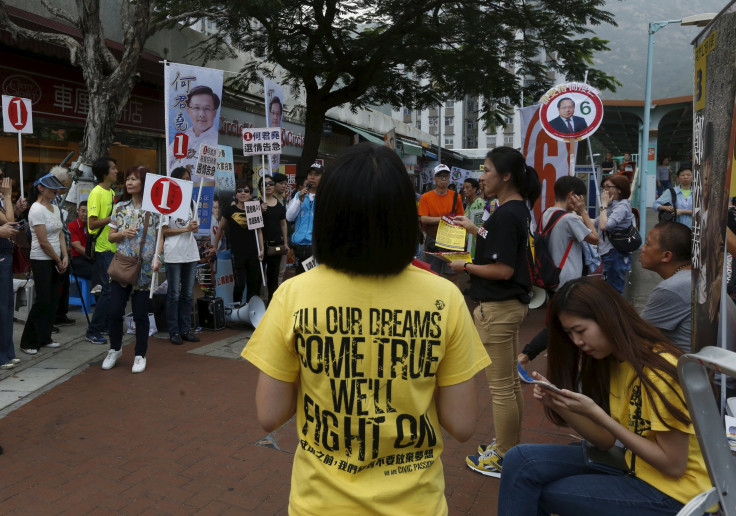Candidates Inspired By Hong Kong Protests Win Seats In Local Polls

HONG KONG (Reuters) - Hong Kong's pro-democracy movement was given a boost on Monday with about eight candidates involved in crippling protests winning office at district elections, while some veterans from both sides of the political divide suffered defeat.
The election of the so-called Umbrella Soldiers - named after the 2014 demonstrations in which activists used umbrellas to guard against tear gas and pepper spray - reflects continued support for political change in the Chinese-ruled city.
"The paratroops are the new force," said James Sung, a political analyst at the City University of Hong Kong, referring to candidates inspired by the Umbrella movement. "The paratroops are a new power, a challenge to the government and the central authorities in Beijing."
Poll results from Sunday's elections, which saw 900 candidates compete for 431 district council seats, where pro-Beijing parties currently hold a majority, were still being announced on Monday.
District councilors wield little power, acting more in an advisory role in which they can push forward policies for the government in the Chinese-controlled city to consider.
But the poll results may provide insight into how elections for the city's powerful Legislative Council, due next year, and a controversial leadership poll in 2017 could pan out.
"It's a very important signal that people want change," said Ma Ngok, an associate professor and department head in the government and public administration department at Chinese University of Hong Kong. "It seems a lot of the older incumbents were unseated."
At least 40 candidates who took part in the democracy protests, or were inspired by them, ran in the elections, Ma said. Two democracy veterans lost their seats.
Democratic Party lawmaker and heavyweight Albert Ho, who faced stiff competition in the gritty new town of Tuen Mun in the western New Territories, lost his seat. So, too, did Frederick Fung, another pan-democratic candidate who ran in the working-class district of Sham Shui Po.
On the pro-Beijing side, Chung Shu-kun of the pro-Beijing Democratic Alliance for the Betterment of Hong Kong was unseated in a surprise move after 21 years.
The mixed results from the elections, in which a record number of people voted, will not significantly change the numerical make-up of pro-democracy and pro-government groups.
The 79-day demonstrations last year, when activists streamed on to highways to demand full democracy for the former British colony, became the biggest political challenge to Beijing's Communist Party leaders in years.
The protests failed to persuade China to allow a fully democratic vote in 2017. Beijing says city voters have to choose from a list of candidates it has approved if they want a vote.
Hong Kong returned to Chinese rule in 1997 under a "one country, two systems" formula that gives it substantial autonomy and freedoms, with universal suffrage promised as an "ultimate goal".
HONG KONG (Reuters) - Hong Kong's pro-democracy movement was given a boost on Monday with about eight candidates involved in crippling protests winning office at district elections, while some veterans from both sides of the political divide suffered defeat.
The election of the so-called Umbrella Soldiers - named after the 2014 demonstrations in which activists used umbrellas to guard against tear gas and pepper spray - reflects continued support for political change in the Chinese-ruled city.
"The paratroops are the new force," said James Sung, a political analyst at the City University of Hong Kong, referring to candidates inspired by the Umbrella movement. "The paratroops are a new power, a challenge to the government and the central authorities in Beijing."
Poll results from Sunday's elections, which saw 900 candidates compete for 431 district council seats, where pro-Beijing parties currently hold a majority, were still being announced on Monday.
District councilors wield little power, acting more in an advisory role in which they can push forward policies for the government in the Chinese-controlled city to consider.
But the poll results may provide insight into how elections for the city's powerful Legislative Council, due next year, and a controversial leadership poll in 2017 could pan out.
"It's a very important signal that people want change," said Ma Ngok, an associate professor and department head in the government and public administration department at Chinese University of Hong Kong. "It seems a lot of the older incumbents were unseated."
At least 40 candidates who took part in the democracy protests, or were inspired by them, ran in the elections, Ma said. Two democracy veterans lost their seats.
Democratic Party lawmaker and heavyweight Albert Ho, who faced stiff competition in the gritty new town of Tuen Mun in the western New Territories, lost his seat. So, too, did Frederick Fung, another pan-democratic candidate who ran in the working-class district of Sham Shui Po.
On the pro-Beijing side, Chung Shu-kun of the pro-Beijing Democratic Alliance for the Betterment of Hong Kong was unseated in a surprise move after 21 years.
The mixed results from the elections, in which a record number of people voted, will not significantly change the numerical make-up of pro-democracy and pro-government groups.
The 79-day demonstrations last year, when activists streamed on to highways to demand full democracy for the former British colony, became the biggest political challenge to Beijing's Communist Party leaders in years.
The protests failed to persuade China to allow a fully democratic vote in 2017. Beijing says city voters have to choose from a list of candidates it has approved if they want a vote.
Hong Kong returned to Chinese rule in 1997 under a "one country, two systems" formula that gives it substantial autonomy and freedoms, with universal suffrage promised as an "ultimate goal."
© Copyright IBTimes 2024. All rights reserved.





















